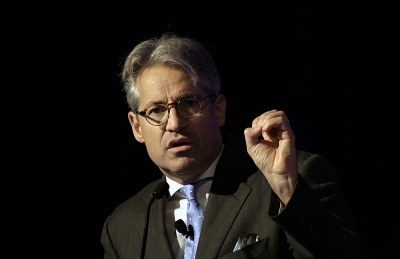Does Science Point to God? Eric Metaxas Pens Popular WSJ Op-Ed on Topic; Critics React
![Variable star LL Orionis interacting with the Orion Nebula. [FILE]](https://cdn.christianpost.com/images/cache/image/6/03/60398_w_700_490.jpg)
Editor's Note: Some media sources, including Eric Metaxas and a previous version of this article, had claimed that the op-ed was the most popular ever on the Wall Street Journal website. On Thursday, Metaxas wrote on his Facebook page: "I believe my WSJ piece is the most popular (most "liked") op-ed ever published on the WSJ site, but it isn't "official". But I'd love to get it confirmed, in case anyone has more info." The Christian Post reached out to WSJ and received this response from a spokesperson: "We can confirm that the op-ed is very popular but don't know that it is the most popular ever."
Best-selling author Eric Metaxas' Christmas day op-ed about scientific evidence for the existence of God became the most popular article ever published on the Wall Street Journal's website, according to the op-ed's writer. Criticisms of the article came from many corners, including some fellow Christians.

Science increasingly supports the hypothesis that the universe has a creator, Metaxas wrote. By calculating the probability that life on Earth emerged from random events, the evidence suggests a designer. The existence of life, and the universe itself, is so highly improbable, according to recent scientific findings, disbelief in an intelligent creator has become far fetched, Metaxas argued.
With more than 200 parameters now known to be necessary for the existence of life on Earth, he wrote, "the odds against life in the universe are simply astonishing."
The probability of the universe itself coming into existence are even higher, Metaxas continued. Citing the work of astrophysicists, he noted that the odds of the universe even coming into existence is equivalent to tossing a coin and it coming up heads 10 quintillion (a one followed by 18 zeros) times. He quoted astronomer Fred Hoyle, theoretical physicist Paul Davies and mathematician John Lennox all making a similar point: credible evidence suggests that the universe has (or had) a creator.
Metaxas is a popular Evangelical author and public speaker. His previous books include biographies of William Wilberforce and Dietrich Bonhoeffer. The op-ed was drawn from Metaxas' most recent book, Miracles: What They Are, Why They Happen, and How They Can Change Your Life.
Lawrence Krauss, a theoretical physicist at Arizona State University and director of the Origins Project, had four critiques of the op-ed: 1) While scientists know the factors that led to life on Earth, life on other planets could be based upon a different set of factors. 2) The odds of life on other planets have increased, not decreased with greater scientific evidence. 3) Life is fine-tuned for the universe rather than the universe being fine-tuned for life. 4) The appearance of design in life on Earth is due to the "remarkable efficiency of natural selection."
You can read all of Krauss' response posted on the Richard Dawkins Foundation website. The stated goal of the foundation is "to remove the influence of religion in science education and public policy, and eliminate the stigma that surrounds atheism and non-belief."
Two other responses came from fellow Christians — Francis Beckwith, professor of philosophy and Church-state studies at Baylor University, and Peter Enns, professor of biblical studies at Eastern University. But, their critiques are largely based upon a misreading of what Metaxas actually wrote.
Beckwith falsely claimed Metaxas argued that science should be the rational basis for believing in God and that faith in God should be based upon the scientific evidence cited by Metaxas. He also mistakenly characterized the Metaxas' op-ed as suggesting a "Watchmaker God" (God created the universe then left it alone to run itself).
Beckwith goes on to argue that philosophy, not science, is the best starting point for a debate with an atheist. (A view that is not inherently incompatible with what Metaxas wrote.)
An unbeliever's "belief that science is the best or only way by which one may properly assess the rationality of belief in God is itself not a deliverance of science, but a philosophical belief about science and its relationship to the limits of our knowledge. So, whether he realizes it or not, the scientific critic of God begins with philosophy, which means that it, and not science, is where the reasonable person should begin," he wrote.
Throughout his critique, Enns characterizes Metaxas as trying to prove the existence of God with science.
"But my basic point here is that thinking that science can prove or disprove God begins with a notion of God where our metaphors are confused for the real thing," Enns wrote.
The Metaxas op-ed never claimed, however, that science can prove the existence of God. In a Monday interview on Fox Business (watch the whole thing below), Metaxas clarified this point.
"It doesn't prove anything, but it's tremendous evidence and we need to deal with the evidence," Metaxas said.




























